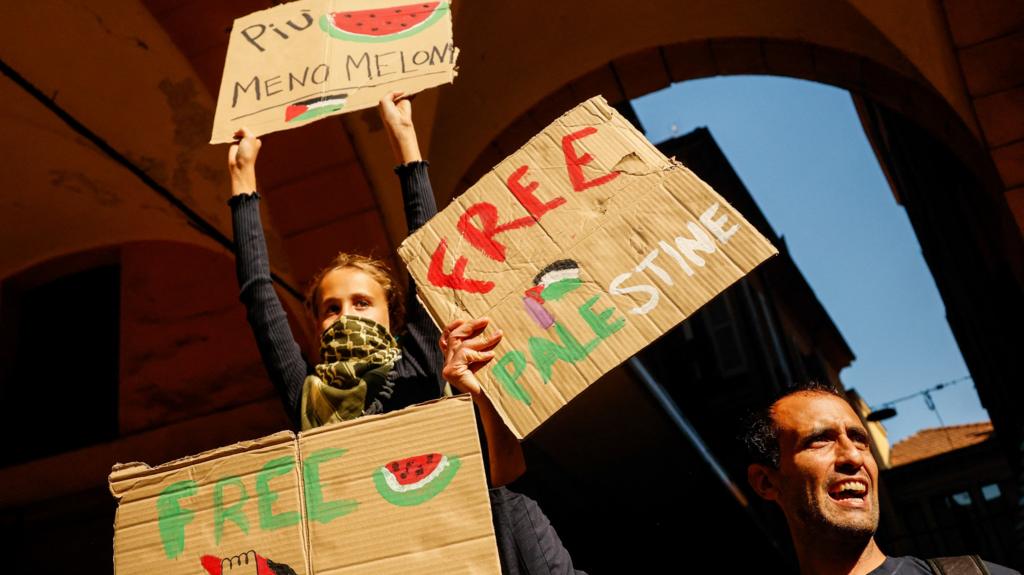Workers across Italy participated in a general strike on Friday, driven by solidarity with the people of Gaza rather than demands for improved wages or working conditions.
Significant demonstrations unfolded in numerous cities, reflecting a growing wave of protests across Europe concerning Israel’s ongoing bombardment and blockade of the Gaza Strip.
According to Italy’s Interior Ministry, the total number of protesters reached approximately 400,000 across 29 locations; however, trade unions estimate the figure to be four times higher.
Tensions escalated this week following the Israeli military’s interception of a flotilla carrying European politicians and activists attempting to deliver food and medical assistance to Gaza, where UN-backed experts have confirmed famine conditions in Gaza City and surrounding areas.
Israel has dismissed the flotilla as a publicity stunt. Over 40 Italian citizens were among those on board.
Italy’s Prime Minister Giorgia Meloni, a member of the hard-right wing, criticized the general strike, asserting that it would not benefit the Palestinian cause and would only disrupt the lives of Italian citizens. She implied that the unionists’ motives were simply to extend the weekend.
Deputy Prime Minister Matteo Salvini echoed this sentiment, deeming the strike illegal due to insufficient notice and threatening sanctions against participants.
Despite these criticisms, large crowds gathered, displaying banners with slogans such as “Stop the Massacre” and “Hands off the Flotilla!”.
In several cities, including Milan and Bologna, clashes erupted as protesters threw stones at police, who responded with tear gas.
In Pisa, a group ignited brightly colored flares and stormed the airport runway, temporarily halting flights, while dockworkers in Naples blockaded the port. In Turin, protesters placed metal barriers on railway tracks.
Similar demonstrations took place in other European cities, from The Hague to Madrid.
In Rome, the main march was substantial but remained peaceful.
Francesca, a university teacher who participated in the walkout, explained, “Governments, especially the Italians, are not taking action against what is happening in Gaza.”
Students at Sapienza University, where Francesca teaches, are staging sit-ins at several faculties.
“We’re here to say that it is time to intervene and solve things,” Francesca stated.
A small tent camp has been erected outside Termini railway station, labeled “Piazza Gaza.” Nearby, a large minimalist statue of Pope John Paul II has been adorned with a Palestinian scarf.
After peacefully marching past these landmarks and through the city center, a segment of the crowd briefly occupied a section of the motorway surrounding Rome. Waving large Palestinian flags and holding flares, they chanted “we’re blocking everything” as they marched through a long tunnel, amplifying their voices while police observed from a distance.
Opposition leader Elly Schlein, speaking to the BBC at the start of the Rome march, stated, “This is the best face of our country. Italy is better than the people who are now in government.”
The Democratic Party leader criticized Italy’s prime minister for failing to condemn “the crimes of the Israeli government” in Gaza and expressed her disappointment that Italy had not joined the growing number of countries recognizing Palestinian statehood.
Israel has described that move by many as a “mark of shame” itself.
Giorgia Meloni has conditioned her government’s recognition on the release of all Israeli hostages and the exclusion of Hamas from government. She has also emphasized Italy’s support for the Gaza peace proposal developed by her close ally, President Donald Trump, a key supporter of Israel.
However, Meloni has recently acknowledged “too many innocent victims” in Gaza and suggested that Benjamin Netanyahu’s government’s response to the Hamas terror attacks of 2023 had “gone beyond the principle of proportionality.”
“This is serious. Certainly, the whole Gaza issue has been putting pressure on Meloni. She actually changed the government’s position to be more critical of Israel,” Prof Giovanni Orsina, a political scientist at Luiss University, told the BBC.
He noted that Catholic public opinion has been “outraged” by events in Gaza, and sees the protest wave as “an awakening” of Italy’s left-wing forces.
“It’s a very clear demonstration that there’s a surge in militancy and that involves a very significant number of people. The government is under pressure and I think it’s nervous.”
As unionists, students, and activists continued to march in various cities, the four Italian politicians who had been detained on the aid flotilla to Gaza arrived back in Rome.
Deported by Israel, they were greeted at the airport with warm embraces from family and colleagues.
More than 40 fellow Italians remain in custody.
Although the flotilla’s cargo of aid was confiscated and humanitarian access to Gaza has not improved, Benedetta Scuderi, an MEP for the Green Left Alliance, still considers the trip a “huge achievement.”
“Lots of us went because we felt impotent, that we couldn’t do anything about what’s happening in Gaza,” she told the BBC shortly after landing back home. “I like to think it’s given some hope to the population.”
“Everything around the flotilla, the protests, the strikes – they are huge. We haven’t seen them in a long time and I don’t think any responsible government can just pretend nothing’s happening.”
Additional reporting by Giulia Tommasi
Hopes are growing of an end to the Israel-Gaza war, but it remains to be seen if the two sides can agree a ceasefire.
The 20-point proposal seeks to end the fighting immediately in return for the release of hostages and detained Gazans.
The Global Sumud Flotilla accused an Israeli vessel of steering “dangerously close” to one of its boats.
Dr Mohammed Abu Mughaisib, who worked in hospitals in Gaza for two years, says Israeli strikes have made conditions “indescribable” for colleagues still there.
BBC Verify analyses President Trump’s peace plan for Gaza and what it means on the ground.

